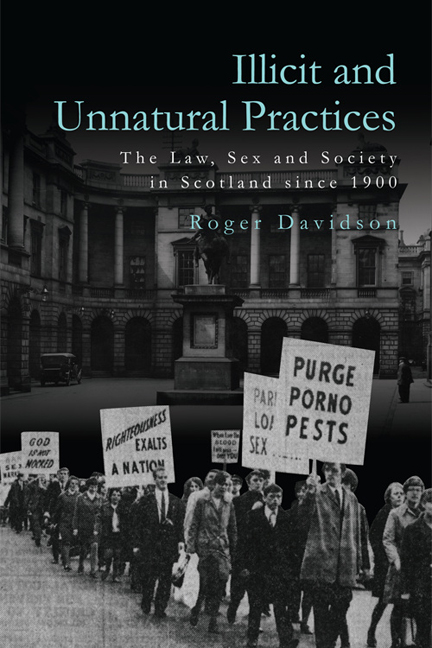Book contents
- Frontmatter
- Contents
- List of Figures and Tables
- Acknowledgements
- List of Abbreviations
- 1 Introduction
- 2 ‘Venereal Trouble’: The Case of ‘Professor’ Abraham Eastburn
- 3 ‘This Pernicious Delusion’: Law, Medicine and Child Sexual Abuse
- 4 ‘Unnatural Carnal Connection’: Bestiality and the Law in Early Twentieth-century Scotland
- 5 ‘There’s the Man who Shifts the Babies’: Abortion in the Scottish High Court, 1900−30
- 6 ‘An Open and Notorious House of Lewdness’: Dora Noyce and the Danube Street Brothel
- 7 Cure or Confinement? Law, Medicine and the Treatment of Homosexual Offenders in Scotland, 1950−80
- 8 ‘Liable or Likely to Deprave and Corrupt the Morals of the Lieges’: Sex Shops and Moral Panic in Late Twentiethcentury Scotland
- 9 ‘Culpable and Reckless Conduct’: Criminalising the Transmission of HIV in Scotland, 1983−2014
- 10 Conclusion
- Sources and Select Bibliography
- Index
7 - Cure or Confinement? Law, Medicine and the Treatment of Homosexual Offenders in Scotland, 1950−80
Published online by Cambridge University Press: 23 April 2021
- Frontmatter
- Contents
- List of Figures and Tables
- Acknowledgements
- List of Abbreviations
- 1 Introduction
- 2 ‘Venereal Trouble’: The Case of ‘Professor’ Abraham Eastburn
- 3 ‘This Pernicious Delusion’: Law, Medicine and Child Sexual Abuse
- 4 ‘Unnatural Carnal Connection’: Bestiality and the Law in Early Twentieth-century Scotland
- 5 ‘There’s the Man who Shifts the Babies’: Abortion in the Scottish High Court, 1900−30
- 6 ‘An Open and Notorious House of Lewdness’: Dora Noyce and the Danube Street Brothel
- 7 Cure or Confinement? Law, Medicine and the Treatment of Homosexual Offenders in Scotland, 1950−80
- 8 ‘Liable or Likely to Deprave and Corrupt the Morals of the Lieges’: Sex Shops and Moral Panic in Late Twentiethcentury Scotland
- 9 ‘Culpable and Reckless Conduct’: Criminalising the Transmission of HIV in Scotland, 1983−2014
- 10 Conclusion
- Sources and Select Bibliography
- Index
Summary
INTRODUCTION
In recent years, the social politics and the legal and medical discourses surrounding homosexuality in twentieth-century Britain have attracted increasing attention from historians and social scientists. Within the growing literature, the medical perception and treatment of homosexuality and homosexual offences have been viewed from a variety of standpoints. Many studies address the subject as a central aspect of the politics surrounding either the regulation of dangerous sexualities or the process of homosexual law reform. Others, often from a social constructionist viewpoint, have focused on the competing sexological and psychoanalytical discourses surrounding homosexuality and their impact upon public policy. Anecdotal evidence of medical attitudes and therapies is also scattered in the written and recorded testimonies of homosexuals. However, with the notable exception of the oral history undertaken by King, Smith and Bartlett,, and, more recently, by Meek, there has been little systematic primary research into the medical perception and treatment of male homosexuality that prevailed in the surgeries, clinics, courts and prisons of the land since World War II. This is especially true in relation to the Scottish experience, despite the distinctive traditions of law and medical practice north of the Border, as well as, arguably, Scotland's distinctive civic and sexual culture.
This chapter seeks to begin to make good this omission by documenting the medical perception and treatment of homosexual offenders in Scotland in the period 1950−80, and, in particular, the role that medical evidence played in the prosecution and sentencing of such offenders. Two main sources of evidence are explored. First, the verbal and written evidence of Scottish witnesses before the Wolfenden Committee on Prostitution and Homosexual Offences (1954−57) is examined in order to identify how homosexual offenders were treated, or allegedly treated, in the 1950s. The Wolfenden Committee was appointed in 1954 in response to a moral panic surrounding an apparent escalation in urban vice and with a remit to consider the law and practice relating to homosexual offences and prostitution. Secondly, a systematic analysis is undertaken of the medical reports on homosexual offenders submitted by psychiatrists and other doctors to Scottish High Court trials and appeals during the period 1950−80, and of their role in court proceedings.
- Type
- Chapter
- Information
- Illicit and Unnatural PracticesThe Law, Sex and Society in Scotland since 1900, pp. 129 - 152Publisher: Edinburgh University PressPrint publication year: 2018



